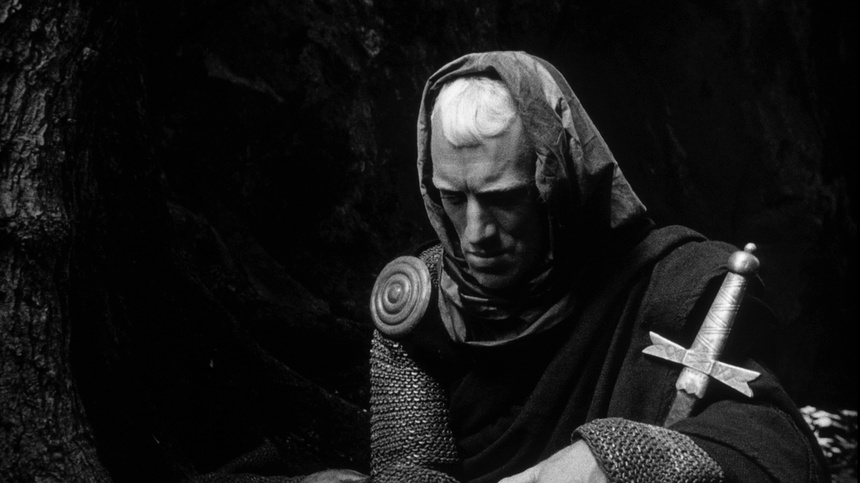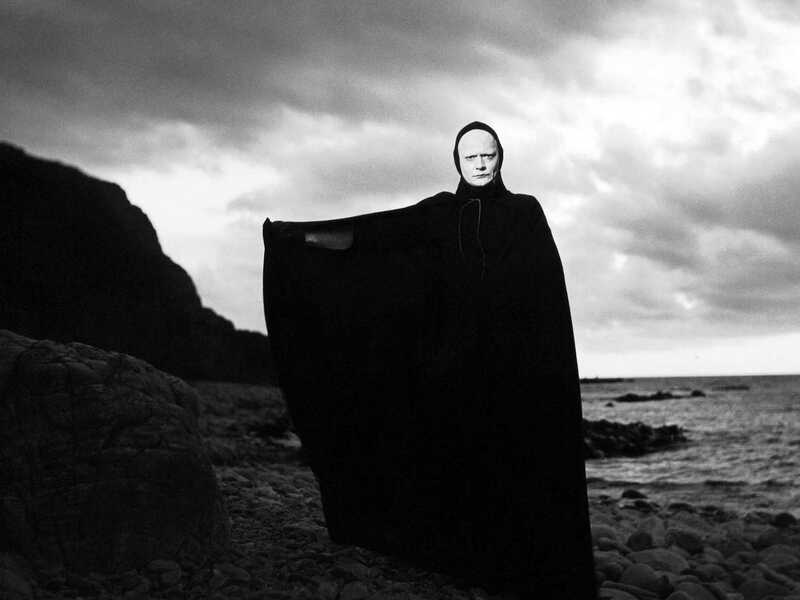THE SEVENTH SEAL Blu-ray Review: A Skull is More Interesting Than a Naked Woman

Famed Swedish filmmaker Ingmar Bergman was only a decade into his half-century career when he made The Seventh Seal. It was not his first film to reach international audiences, nor the first one to receive great acclaim. But it was, perhaps, the one for whom the largest audience is familiar, if only for its famous iconography of the Knight playing chess with Death. But far from being a gimmick, this iconography is referential because of its raw and complex power, one that shines in this new restoration done by Criterion.
The story of a knight and his squire returning to their native Sweden, and finding it stark and bereft as much of the population succombs to the black plague, has been a cornerstone not only of Bergman's oeuvre, but of mod-20th century cinema. It introduced the world to the late, great Max von Sydow, and presented a world that looked and felt on the brink of apocalypse. Based on Bergman's play 'Wood Painting', Berman has called one of around 10 films he made that he thinks is good (trust me, there are many more great ones in his filmography).
Antonius Block (von Sydow), a knight, and Jöns (Gunnar Björnstrand), have returned to Sweden after a 10-year absence, fighting in the Crusades. They return to find much of country decimated by the plague. On a beach, Death (Bengt Ekerot) comes for Block, but the knight convinces Death to play a game of chess instead - once the game is finished, Block will accept his fate. The game takes places in several locals as Block and Jöns return to their castle, and on the way they meet a travelling theatre group, a blacksmith, a painter, and monks who prostrate themselves in an effort to seek god's forgiveness.
Watching the film again after many years, I was struck by two things. That first scene with death is still iconic and still chilling. Ekerot's costume and make up were designed to make him something between a skull and a clown - an effect that will make someone blurt out a nervous laugh while shivers run down their spine. The eternal footman, as Death is sometimes called, seems a reasonable and not entirely cold entity, yet he has his job and will not be shirked from it. Even his agreeing to this chess game seems to come from a weariness that floats between him and Block. Block is not as clever as Death (no one is), but he can sense his time has come, and perhaps they are still some things he needs to learn before he dances one last time.
The second point I had forgotten, was how witty the film is. Block often has a small smile at the corner of his lips, as if the private joke for him alone is not worth sharing but is etched on his memory. Jöns, on the other hand, as a proper squire, shares his wit liberally, and the humour that abounds from the other characters keeps the tone - not light perhaps, as the land is still covered with the mist of death soon to envelop them all - baudy and a little rough. This humour of the land, of the bodies that work the land, of those in the villages who have been abandoned to their fate. This is where humour and folklore of a culture come from and what will still be in the land once the plague finally passes over.
Even nearly 70 years after its release, The Seventh Seal remains timeless as the death, the decay, the joy, the humour, and the haunting madness it examines. We are all caught in this web of life and death, the permanent precariousness of existence and how we manage it with humour, love, and a touch of evil sometimes. Like the chess game, it takes skill, strategy, but also wit and patience, to survive this world until he comes for us.
Special Features
The film's original aspect ration of 1.37:1 is maintained, the restoration of the film done by the Swedish Film Institute, from a 4K scan of the 35mm original camera negative. The restoration of a black and white film has its challenges - will the greyscale be as nuanced as it was when it first played on the silver screen? Will digitization mean the natural flaws of film that bring character, will be erased? Since this is a story of people walking through the last valley towards the darkness of death, those black and whites needed to be stark, and they are. It is through the characters that we see the colour - their conversations, the performances of the theatre troupe, all provide the nuance which perhaps is even more enhanced by black and white. Von Sydow's tall, lithe frame, stark white hair, and gaunt face, even though he wasnt' even 30 years old - the 4K and Blu ray discs make you feel like maybe your own world should be viewed in this black and white way, where emotions and actions are more prominent and the colour can be felt.
There is a wonderful short introduction to the film by Bergman, originally intended for when the film would be broadcast on television (and where he humbly admits to only thinking a few of his films are good). Peter Cowie gives an excellent audio commentary and video afterward - you definitely should watch Bergman's intro before, and Cowie's afterward, especially if you have seen the film before, as it will make you think more on what you've seen and what it means. There is also a collection of audio interviews with von Sydow; not just about The Seventh Seal but an overview of his acting life, his father (who was a folklorist), his start in theatre and what it was like to work with Bergman, and how it was always preferable to work in Sweden (where he could take risks as an actor) as opposed to Hollywood (where one failure killed your career).
If you are new to Bergman, The Seventh Seal is a good place to start in his filmography, and this disc also included a 30-minute introduction to Bergman by Cowie. Given his dense career and long life, Cowie fits a lot into this time (there was much I didn't know about Bergman, particularly his early years in theatre and later years working almost exclusively in television). The same is true of the documentary Bergman Island: Ingmar Bergman on Fårö Island, Cinema and Life. Bergman discusses his career, his many loves (and that's quite the moment as he admits to his 'philosophy' of relationships, when he moved from Bibi Andersson and Liv Ullman), his beloved island of Fårö and what it meant to his development as an artist, and his list of 'demons' that haunted him through his life.
The booklet essay 'There Go the Clowns' by Gary Giddens, gives exellent insight into how the film was received, how perhaps it needs to be be re-seen as not merely some serious 'necessary' film but as one that mixes both heady and witty philosophical musings. Its pairing of the Knight and his squire in a kind of Quixote/Sancho dichotomy, the importance Bergman placed on the role of women, the deceptively extensive exploration of the meanings of life and death contained within the film, mean The Seventh Seal is timeless in the best way possible.
The Seventh Seal is now available from The Criterion Collection.
The Seventh Seal
Director(s)
- Ingmar Bergman
Writer(s)
- Ingmar Bergman
Cast
- Max von Sydow
- Gunnar Björnstrand
- Bengt Ekerot








